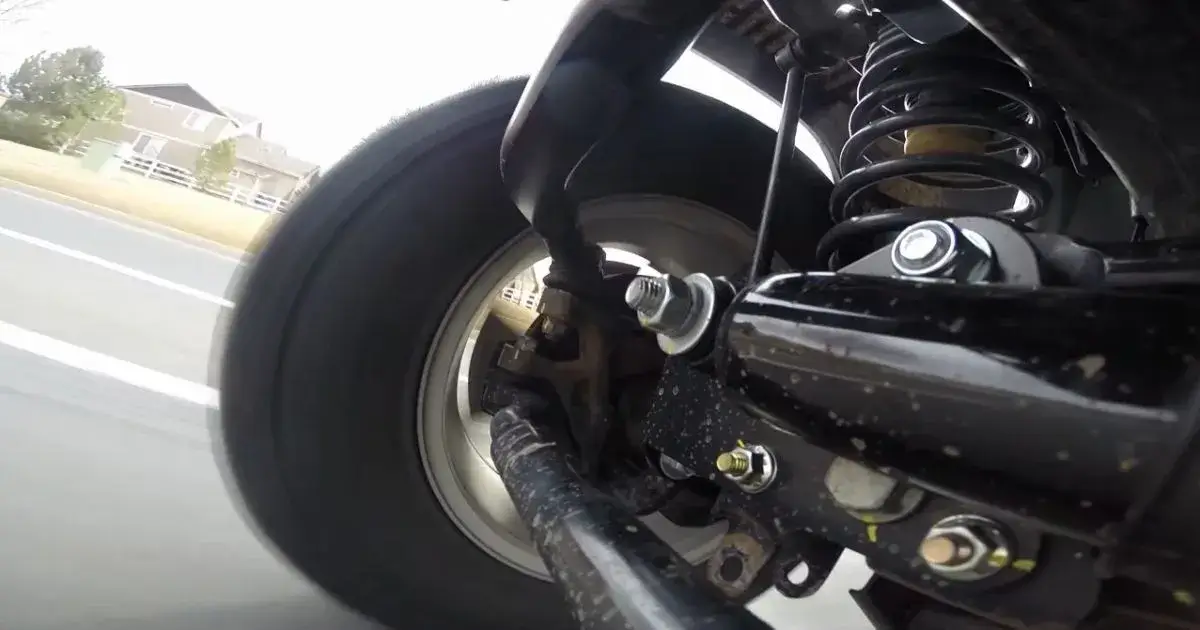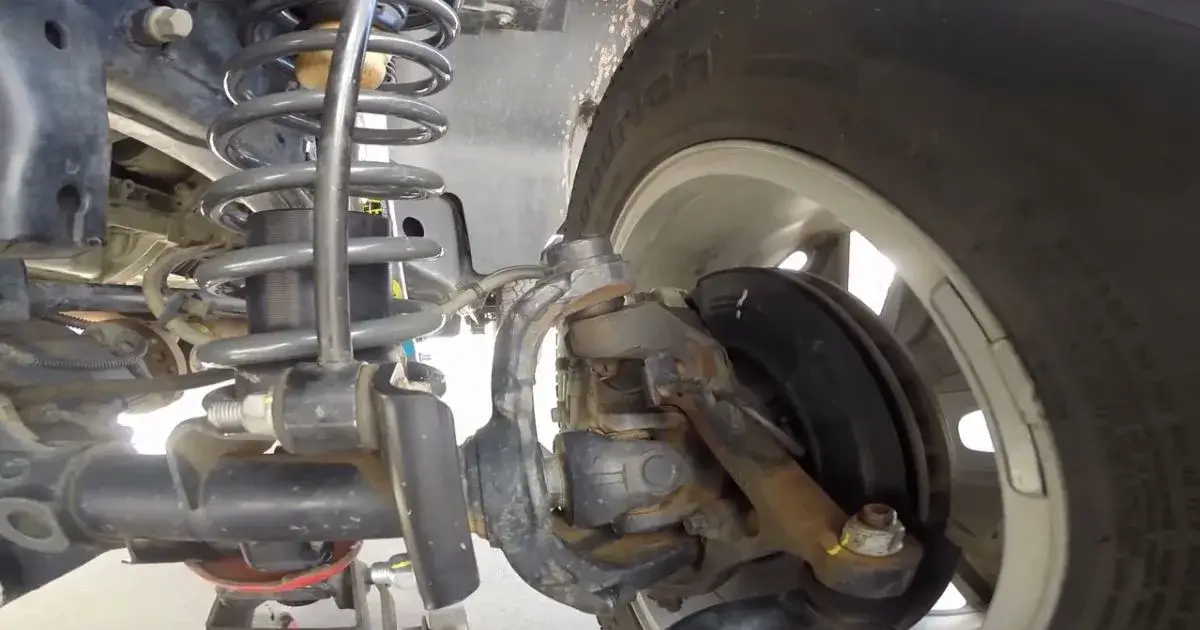One potential reason your Jeep may shake when you hit a bump is that the shocks or struts are worn out. Over time, these components can wear down and no longer provide adequate support for the vehicle, resulting in a rough ride.
Another possibility is that the wheels are out of balance. This can happen if you hit a pothole or curb too hard, causing one of the weights on the wheel to become dislodged. If your Jeep is shaking only when you hit a bump, it’s likely an issue with the suspension.
However, if it’s shaking all the time, even when driving on smooth roads, there could be another problem, such as engine misfire or tire issues.
If you’re not sure what’s causing the problem, take your Jeep to a mechanic for an inspection.

Is It Normal for Jeeps to Shake?
Shaking can occur in any vehicle, including Jeeps, and can be caused by various factors such as imbalanced wheels, worn suspension components, and brakes issues.
However, it is not considered normal for a Jeep to shake excessively. If you’re experiencing shaking, it’s best to have the vehicle inspected by a mechanic to determine the cause and make any necessary repairs.
Why Does My Jeep Shake When I Go Over a Bump?
There are a few reasons your Jeep might shake when you go over a bump. It could be because of the shocks or struts, which are designed to absorb impact and keep the vehicle from bouncing. If they’re worn out, they won’t be able to do their job as well, and the shaking will become more pronounced.
Another possibility is that the suspension bushings have become worn out. These act as cushions between moving parts of the suspension, and if they’re not doing their job, it can cause excessive movement and vibration.
Finally, it could simply be that your tires are unbalanced or wearing unevenly. This can cause a lot of vibration, especially at higher speeds. If you suspect any of these issues, it’s best to take your Jeep to a qualified mechanic for an inspection.
Jeep Death Wobble After Hitting Bump
If you own a Jeep, you may have experienced the “death wobble.” This is a common issue that occurs when hitting a bump while driving. The death wobble is caused by the suspension system and can be fixed with some simple adjustments.
The death wobble is most likely to occur when driving on a rough road or hitting a pothole. It can also happen if your Jeep’s suspension is not properly maintained. If you hit a bump and your Jeep starts to shake, it’s important to stay calm and avoid overreacting.
Overreacting can make the situation worse and cause an accident. If you find yourself in the middle of a death wobble, the best thing to do is slow down gradually and pull over to the side of the road.
Once you’re safely off the road, check your suspension system for any damage or loose parts. If everything looks okay, gently drive your Jeep around for awhile to see if the death wobble goes away.
If it doesn’t, it’s time to take your Jeep to a mechanic for further diagnosis. No one wants to experience the death wobble, but it’s important to know how to deal with it if it happens.
By following these steps, you can keep yourself safe and get your Jeep back on the road in no time!
Jeep Wrangler Shaking When Accelerating
If your Jeep Wrangler is shaking when you accelerate, it could be a sign of a few different issues. It’s important to get to the bottom of the problem so that you can make the necessary repairs and avoid further damage.
One possibility is that your engine mounts are worn out or damaged. Engine mounts keep your engine in place and help reduce vibration. If they’re not functioning properly, it can cause your Jeep to shake when you hit the gas.
Another possibility is that your tires are unbalanced or wearing unevenly. This can also cause shaking, particularly at higher speeds.
Finally, it could simply be that your Jeep needs a tune-up or some other type of repair. If your Jeep Wrangler is shaking when you accelerate, take it to a trusted mechanic for diagnosis and repair.
In the meantime, drive cautiously and don’t push your vehicle beyond its limits until the problem has been resolved.
Why is My Jeep Shaking When Idling
My Jeep is shaking when I am idling. What could be the problem? There are a few things that could be causing your Jeep to shake when you are idling.
It could be something as simple as a loose gas cap, or it could be something more serious like an engine misfire. Let’s take a look at some of the most common reasons why your Jeep might be shaking when you are idling.
One reason why your Jeep might be shaking when you are idling is because of a problem with the ignition system. If the spark plugs are worn out or dirty, they can cause the engine to misfire and shake.
Another possibility is that the ignition coil is failing and needs to be replaced.
Another reason why your Jeep might be shaking when you idle could be due to a problem with the fuel system. If there is dirt or debris in the fuel tank, it can clog up the fuel injectors and cause them to misfire. The fuel filter may also need to be replaced if it is clogged and not allowing enough fuel to reach the engine.
If your Jeep has been shaking when you idle for awhile, it could also be due to an issue with one of the engine mounts. If an engine mount is damaged or broken, it can cause vibration and noise which will make your Jeep shake while it is idling.
Why is My Jeep Cherokee Shaking When Idling
If your Jeep Cherokee is shaking when idling, it could be due to a number of different issues. It could be something as simple as a loose connection or dirty sensor, or it could be something more serious like an engine misfire.
In any case, it’s important to diagnose the problem so that you can fix it and get back on the road.
One possible cause of your Jeep shaking when idling is a loose connection. Check all of your connections, including those for the spark plugs, wires, and sensors. If any of them are loose, tighten them up and see if that fixes the problem. If not, then you’ll need to move on to other potential causes.
Another possibility is that one or more of your sensors are dirty or malfunctioning. The most likely suspects are the mass air flow sensor or oxygen sensor. Cleaning or replacing them may solve the problem.
However, if they’re not the issue, then it’s time to check for engine problems. One final possibility is that your Jeep has an engine misfire. This can happen for a number of reasons, such as bad spark plugs, faulty injectors, or compression issues.
Diagnosing and fixing an engine misfire can be tricky, so it’s best to take your Jeep to a qualified mechanic if this turns out to be the issue.

How Do You Fix a Jeep Death Wobble?
If you own a Jeep Wrangler, it’s likely that you’ve experienced the “death wobble.” This phenomenon occurs when the front end of the Jeep starts to shake uncontrollably, usually at high speeds. While it can be quite unnerving, there are ways to fix the death wobble.
One way to fix the death wobble is to check your steering components. Make sure that your steering damper is in good working condition and that all of your steering linkage is tight.
You may also want to check your tires for any uneven wear. Uneven tire wear can cause the death wobble by throwing off your Jeep’s balance.
Another way to fix the death wobble is to adjust your track bar. The track bar helps keep your Jeep’s axle centered beneath the vehicle body. If it’s out of alignment, it can cause the death wobble. To adjust your track bar, simply loosen the bolts and rotate it until it’s in the correct position. Then, retighten the bolts and take your Jeep for a test drive.
If you’re still experiencing the death wobble after checking these things, then you may need to replace some parts. Worn out shocks or suspension components can often times be responsible for causing the death wobble. Replacing these parts will usually fix the problem once and for all.
So if you’re having trouble with your Jeep Wrangler Death Wobbling, don’t despair! There are ways to fix it so that you can get back on (and off) road without any worries.
Why Does My Car Shake After I Hit a Bump?
If your car is shaking after hitting a bump, it could be due to a number of different factors.
First, it’s important to rule out any potential mechanical issues that could be causing the problem. If your car has been in an accident, even a minor one, there could be damage to the suspension or frame that is causing the shaking.
If you hit a large pothole or other object in the road, it’s possible that you’ve damaged your tires or wheels. Once you’ve ruled out any mechanical problems, there are a few other potential causes of car shaking. One possibility is that your shocks or struts are worn out and need to be replaced.
Another possibility is that your tires are unbalanced or not properly inflated. If you have mismatched tires on your car, this can also cause shaking.
Finally, if you live in an area with bad roads, the constant vibration from driving can lead to shakey steering or other problems.
If your car is shaking after hitting a bump and you can’t figure out why, the best thing to do is take it to a mechanic and have them check it out. They’ll be able to diagnose the problem quickly and get you back on the road safely.
The Dodge and Jeep Death Wobble Why and how to fix it
Wrapping Up
If your Jeep is shaking when you hit a bump, it’s most likely due to one of three things: uneven tire tread, worn shocks, or a loose suspension.
Uneven tire tread can cause your Jeep to shake at high speeds, but it will also make your Jeep less stable on the road. Worn shocks are another common culprit of a shaky ride. If your shocks are worn out, they won’t be able to dampen the impact of bumps as effectively, causing your Jeep to shake.
Lastly, a loose suspension can also cause your Jeep to shake. If any of your suspension components are loose, they’ll allow more movement in the suspension system, which can lead to a jarring ride.

